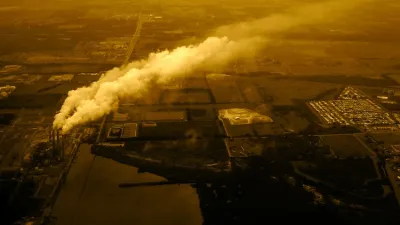A federal evaluation of fuel-efficiency standards says that while drastic climate change is imminent, there is little reason to do anything about it.

In August, an environmental impact statement from the National Highway Traffic Safety Administration noted that the planet would experience a seven-degree temperature increase by the end of the century. However, it did not describe the consequences of this level of climate change:
A rise of seven degrees Fahrenheit, or about four degrees Celsius, compared with preindustrial levels would be catastrophic, according to scientists. Many coral reefs would dissolve in increasingly acidic oceans. Parts of Manhattan and Miami would be underwater without costly coastal defenses. Extreme heat waves would routinely smother large parts of the globe.
Instead, the statement argued that a massive and infeasible shift away from fossil fuels would need to occur to avoid this temperature increase. The Trump administration says that its proposed freeze on fuel-efficiency standards will not have a substantial effect on global warming.
Critics have pointed out the problems with suggesting that fuel standards be rolled back because their impact would be minimal:
Using the no-action scenario "is a textbook example of how to lie with statistics," said MIT Sloan School of Management professor John Sterman. "First, the administration proposes vehicle efficiency policies that would do almost nothing [to fight climate change]. Then [the administration] makes their impact seem even smaller by comparing their proposals to what would happen if the entire world does nothing."
Environmental advocacy groups, scientists, and public officials in the United States and from around the world continue to push for policies and actions they say will address climate change.
FULL STORY: Trump administration sees a 7-degree rise in global temperatures by 2100

Analysis: Cybertruck Fatality Rate Far Exceeds That of Ford Pinto
The Tesla Cybertruck was recalled seven times last year.

National Parks Layoffs Will Cause Communities to Lose Billions
Thousands of essential park workers were laid off this week, just before the busy spring break season.

Retro-silient?: America’s First “Eco-burb,” The Woodlands Turns 50
A master-planned community north of Houston offers lessons on green infrastructure and resilient design, but falls short of its founder’s lofty affordability and walkability goals.

Test News Post 1
This is a summary

Analysis: Cybertruck Fatality Rate Far Exceeds That of Ford Pinto
The Tesla Cybertruck was recalled seven times last year.

Test News Headline 46
Test for the image on the front page.
Urban Design for Planners 1: Software Tools
This six-course series explores essential urban design concepts using open source software and equips planners with the tools they need to participate fully in the urban design process.
Planning for Universal Design
Learn the tools for implementing Universal Design in planning regulations.
EMC Planning Group, Inc.
Planetizen
Planetizen
Mpact (formerly Rail~Volution)
Great Falls Development Authority, Inc.
HUDs Office of Policy Development and Research
NYU Wagner Graduate School of Public Service



























